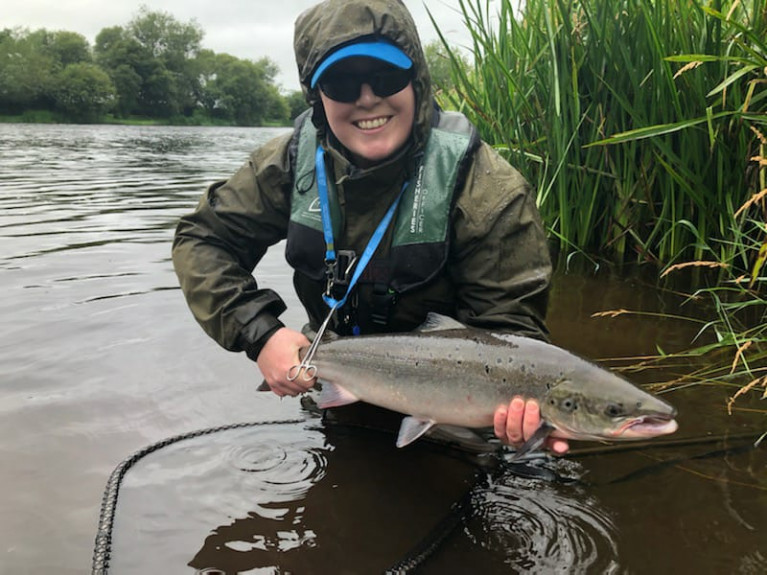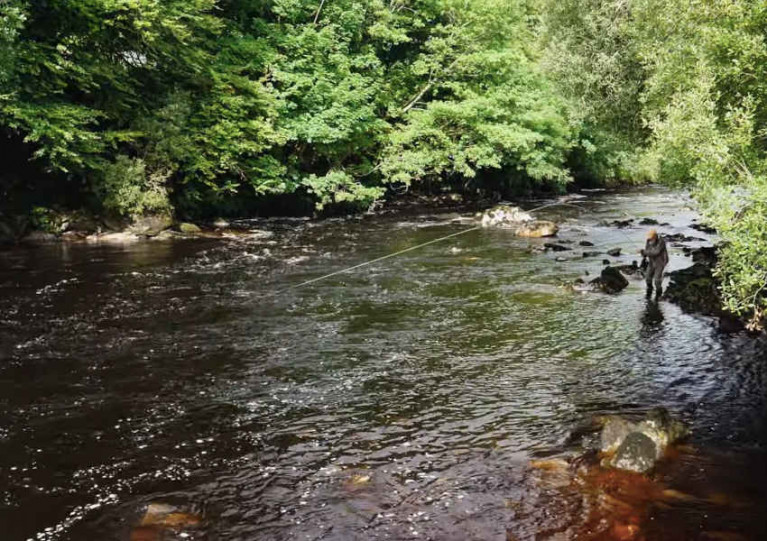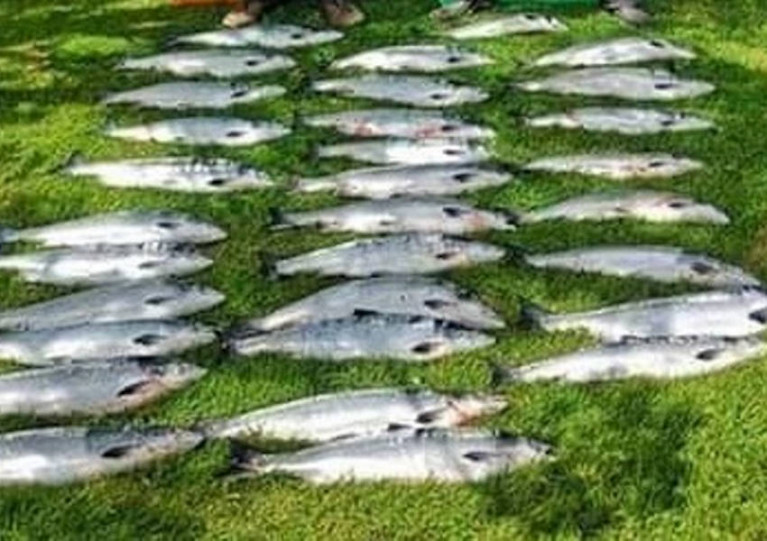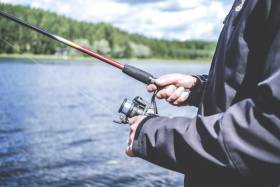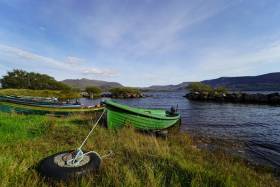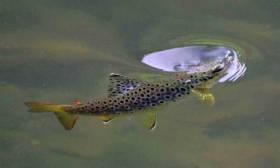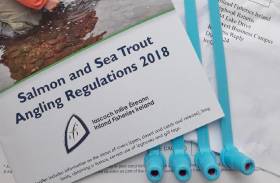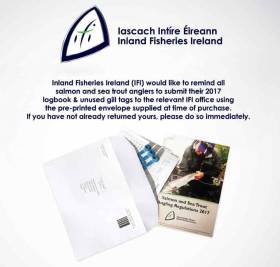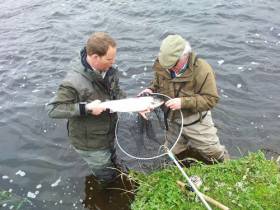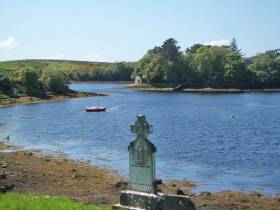Displaying items by tag: Sea Trout
Salmon & Sea Trout Angling Licences for 2021 Now Available
Inland Fisheries Ireland (IFI) has reopened its sales of salmon and sea trout angling licences for the 2021 season.
E-licences can now be purchased online and will be delivered along with a logbook straight to your phone or computer. Gill tags will be dispatched by post.
There is no price change for salmon and sea trout angling licences this year and licence fees will remain the same across all classes, including those for juvenile anglers.
Anglers are legally required to be in possession of a licence and logbook when fishing for salmon or sea trout. Online licences must be printed off along with the logbook and in the possession of anglers while fishing.
For anglers who require tags on or before Tuesday 5 January, online licences must be purchased on or before Monday 21 December.
Alternatively, angling licences will be available to purchase from approved licence sales distributors from the end of December/early January.
For those anglers who do not require tags in advance of 5 January, online licences and logbooks will be available from the IFI online shop throughout the Christmas period.
Anglers are advised to comply with Government guidelines specific to the region in which they live and wish to travel to. IFI has published updated advice for anglers, who are also reminded to check before travelling as due to Covid-19, working arrangements for distributors and fisheries may have changed.
IFI chief executive Francis O’Donnell said: “We are happy to announce the opening of 2021 licence sales for salmon and sea trout angling. We would like to use this opportunity to recognise the contribution salmon and sea trout anglers make to the sustainability of the resource by paying their licence fee and supporting the Salmon and Sea Trout Rehabilitation, Conservation, and Protection Fund as a result.”
The costs for salmon licences will remain as follows:
- All Districts (ie all Regions) Annual: €100
- Juvenile (under the age of 18 years) All Districts Annual: €10
- One District, Annual: €56
- All districts, 21 Days: €40
- All districts, 1 Day: €20
- Foyle Area Extension: €80
IFI also reminds all salmon and sea trout anglers to return their 2020 angling logbook and unused gill tags as soon as possible, even if there is no catch recorded.
Anglers are asked to make the return via the business return envelope which was supplied at the time of license purchase. Otherwise, anglers can return their completed logbook and unused tags to the IFI office address on their licence/logbook.
These returns will provide vital information regarding the status and management of our wild Atlantic salmon and sea trout stocks for the future.
Foyle & Carlingford Anglers Urged to Make 2020 Catch Returns to Support Scientific Research
The Loughs Agency is reminding anglers in the Foyle and Carlingford areas to log and submit their angling effort, catches and releases for the 2020 season.
Rod licences for salmon and sea trout in Foyle and Carlingford come with a legal obligation to inform the Loughs Agency (via the eLicence web portal) of how many times the licence holder went fishing and got many fish they caught.
To date, the agency says less fewer than 10% of anglers have made their return for the 2020 season.
For the 2020 season, the Loughs Agency will be carrying out an in-depth study of catch returns and angling effort to determine fish runs in rivers, number of fish caught, weight of fish caught and/or released, and how much time anglers put into catching those fish.
As a result, anglers are encouraged to make their return and be as accurate as possible with locations, dates, weights, species, methods and time spent fishing.
The deadline for catch returns is Thursday 21 January 2021.
The hospitality industry and general public alike have been reminded not to purchase illegally caught salmon or sea trout after illicit nets were seized on a fishing boat off Cork last week.
Fisheries protection officers with Inland Fisheries Ireland (IFI) boarded the vessel off the Cork coast last Monday 13 July on which they seized 98kg of salmon and 256 metres of illegal net.
IFI notes that the incident was one of several that took place earlier this month, with similar seizures in Donegal and Mayo.
“The risk of targeted netting of salmon at sea remains the highest priority for our protection staff, who have seized 15 nets in the South Western River Basin region so far this season,” said IFI’s deputy chief executive Dr Greg Forde.
Only salmon or sea trout that have been caught by licensed commercial salmon fishermen may be sold to the public and hospitality industry, and must bear a colour coded green or white gill tag — or for wild imported salmon, a yellow tail tag.
Anglers are prohibited from selling any salmon or sea trout caught by rod and line. In addition, rod-caught salmon must have a blue tag affixed, IFI added.
Fisheries officers carry out regular inspections of premises to deter the illegal trade of salmon and sea trout. Reports of suspected illegal activity can also be made directly to IFI staff or on the confidential hotline at 1890 34 74 24 or 1890 FISH 24.
Salmon & Sea Trout Angling Licences For 2020 Are Now Available Online
Licences for salmon and sea trout angling for the 2020 season can now be purchased online along with log books and gill tags, Inland Fisheries Ireland (IFI) has announced.
Licence fees remain the same across all classes including those for juvenile anglers. An annual licence covering all districts costs €100 (€10 for juveniles under 18 years), while licences for single districts are €56 for the year, €40 for 21 days and €20 for a single day. Licences for the Foyle Area Extension are €80.
Anglers are legally required to be in possession of a licence when fishing for salmon or sea trout.
Licences should be purchased online by next Wednesday 18 of December to allow time for delivery before Christmas and the New Year. IFI cannot guarantee dispatch in advance of the holidays due to postage deadlines.
Online licences can also be acquired directly from your local IFI office or approved online licence sales distributors.
Angling licences other than online sales will be available to purchase in approved licence sales distributors from the end of December or early January.
IFI also reminds all salmon and sea trout anglers to return their 2019 angling logbook and unused gill tags as soon as possible, even if there is no catch recorded.
These returns will provide vital information regarding the status and management of our wild Atlantic salmon and sea trout stocks for the future.
Anglers are asked to use the business return envelope which was supplied at the time of license purchase. In the absence of the prepaid return envelope, anglers can return their completed logbook and unused tags to the IFI office address on their licence/logbook.
Inland Fisheries Ireland (IFI) has recently commenced a comprehensive sea trout assessment and monitoring programme in the Lough Currane catchment in Kerry.
The project, called Currane STAMP, aims to identify potential factors contributing to the apparent decline of sea trout populations in the area in recent years.
It follows reports from anglers of reduced catches and is funded by IFI through its Salmon and Sea Trout Rehabilitation, Conservation and Protection Fund.
Sean Canney, Minister of State with responsibility for inland fisheries, said: “The Currane system is an internationally renowned angling hotspot for salmon and sea trout and hosts some of the longest lived and largest sea trout found in Ireland.
“However, recent indications from angler rod catch reports suggest declines in sea trout populations in the system and I support Inland Fisheries Ireland’s attempts to get to the bottom of these developments.”
The Currane project is one of 25 across 16 counties which have been awarded funding by IFI through its National Strategy for Angling Development.
The organisation today (Thursday 5 December) announced funding of €1 million for fisheries conservation, protection and education initiatives and for projects which will give the public greater access to fishing sites around the country.
In total, €242,900 has been awarded to the research project on the Currane — €55,800 in 2018 and a further €187,000 in this latest funding call.
A separate initiative at Scartleigh Weir near Listowel will also receive €6,000 to support the provision of CCTV equipment to monitor illegal poaching activity in the area.
As part of the programme on the Currane, researchers will use a combination of traditional and novel research techniques to examine important aspects of sea trout ecology throughout their life stages.
‘This project will help to answer key questions related to the apparent decline of trout in the area’
Habitat surveys will map important spawning and nursery areas while electrofishing (a benign technique used to catch fish by stunning them for a short period of time) will be conducted to assess juvenile fish population trends against previous studies in the area.
IFI researchers have already begun tracking the movement of juvenile sea trout tagged with tiny acoustic tags. Acoustic receivers, which record the movement of any tagged sea trout passing within range, have been strategically placed in freshwater in the Currane system and in the sea in Ballinskelligs Bay with a view to uncovering the freshwater movement and inshore migratory routes of sea trout and determining their survival in the marine environment.
The research will be co-ordinated and conducted from Met Éireann’s Valentia Observatory in Cahersiveen where IFI research officer Ryan Murray will be based and supported by experienced local fisheries staff.
In addition to the sea trout assessment, the team will also work on a salmon monitoring programme which will aim to determine if population trends between the two species are related or independent.
IFI’s head of R&D Dr Cathal Gallagher said: “This research will collect vital information on sea trout which will ultimately inform management strategies which may be required to combat the possible deterioration of sea trout in the Currane system. I would like to acknowledge the support of Met Éireann for this project and we look forward to working with local anglers on the ground to help establish the status of sea trout populations.”
As part of a citizen science initiative within the programme, IFI will be enlisting the invaluable knowledge and assistance of local anglers to establish current and historical rod catch trends.
Neil O’Shea, a fourth generation Currane ghillie who is supporting the programme, said: “I am looking forward to contributing to the sea trout citizen science component developed by Inland Fisheries Ireland. This project will be important for the sea trout fishery in Currane and will help to answer key questions related to the apparent decline of trout in the area.”
Public Consultation On New Bye-Law For River Bandon Trout
#Angling - Submissions are now open in a public consultation hosted by Inland Fisheries Ireland (IFI) around a proposed angling bye-law which focuses on the conservation of sea trout and brown trout on the River Bandon.
The new bye-law aims to help conserve the numbers of brown trout of all sizes taken from upstream areas of the river and its tributaries, as well as the numbers of young sea trout taken in the lower river and upper estuary.
There is currently no minimum length size specified when catching and retaining a sea trout or brown trout on the river. In addition, there is no ‘bag limit’ on the number of brown trout an angler can retain.
The new bye-law would set a minimum length of 25 centimetres for any sea trout or any brown trout caught and retained on the waters of the River Bandon and its tributaries, and a bag limit of not more than three brown trout per day on the waters of the River Bandon and its tributaries.
The bye-law would also require anglers to fish by catch-and-release methods, ban the use of worms, and allow only single barbless hooks in angling for brown trout once the three per-day bag limit had been reached.
Interested parties should make a submission to the consultation in writing. Submissions should be marked ‘Public consultation – River Bandon (Conservation of Trout)’ and be submitted by post to Inland Fisheries Ireland, Sunnyside House, Macroom, Co Cork, P12 X602 or by email to [email protected].
The deadline for receipt of submissions is 5pm on Monday 31 December. All submissions received by IFI will be published on its website at www.fisheriesireland.ie.
Salmon & Sea Trout Anglers Reminded To Submit 2018 Logbook & Gill Tags
#Angling - Salmon and sea trout anglers are reminded of the importance of returning their 2018 angling logbook and unused gill tags to Inland Fisheries Ireland.
These returns provide vital information and facilitate informed decision-making on Ireland’s wild Atlantic salmon and sea trout stocks, according to the fisheries body.
Anglers are asked to return their logbook as part of the Wild Salmon and Sea Trout Tagging Scheme, which regulates salmon and sea trout fishing in Ireland and is administered by Inland Fisheries Ireland.
In accordance with this scheme, anglers are required by law to return their completed logbook and all unused tags to the issuing office once they have finished fishing for the season, or as soon as the season is over at the end of September and no later than the 19 October annually.
Anglers are reminded that they can only retain a maximum of one salmon per day in a fishery with a surplus, provided they still have remaining tags in the month of September.
The return of logbooks and tags can be done via the business return envelope which was supplied at the time of license purchase. In the absence of such an envelope, anglers can return their completed logbook and unused tags to the IFI office addressed on their licence/logbook.
The records from this year’s angler returns will support management decisions in 2019.
As part of the scheme, an angler must attach a valid gill tag to a salmon (any size) or sea trout (over 40cm) immediately on landing. They then must enter the details of the catch and gill tag used into their logbook. If the fish is to be released, anglers must also make a catch record in their logbook.
IFI chief executive Dr Ciaran Byrne said: “As the end of season approaches, we are reminding salmon and sea trout anglers to return their logbooks and unused tags as soon as possible.
“The vast majority of anglers appreciate the importance of their data in terms of the conservation of our precious fisheries resource.”
For more information on the Wild Salmon and Sea Trout Tagging Scheme and IFI, visit www.fisheriesireland.ie. Any queries in relation to the scheme can be sent to [email protected].
Inland Fisheries Ireland: Reminder to All Salmon & Sea Trout Anglers
Inland Fisheries Ireland (IFI) would like to remind all salmon and sea trout anglers to submit their 2017 logbook and unused gill tags to the relevant IFI office using the pre-printed envelope supplied at time of purchase.
Your contribution to the management of our wild Atlantic salmon stocks for 2018 is very important. 69% of anglers returned their logbook and unused tags last year.
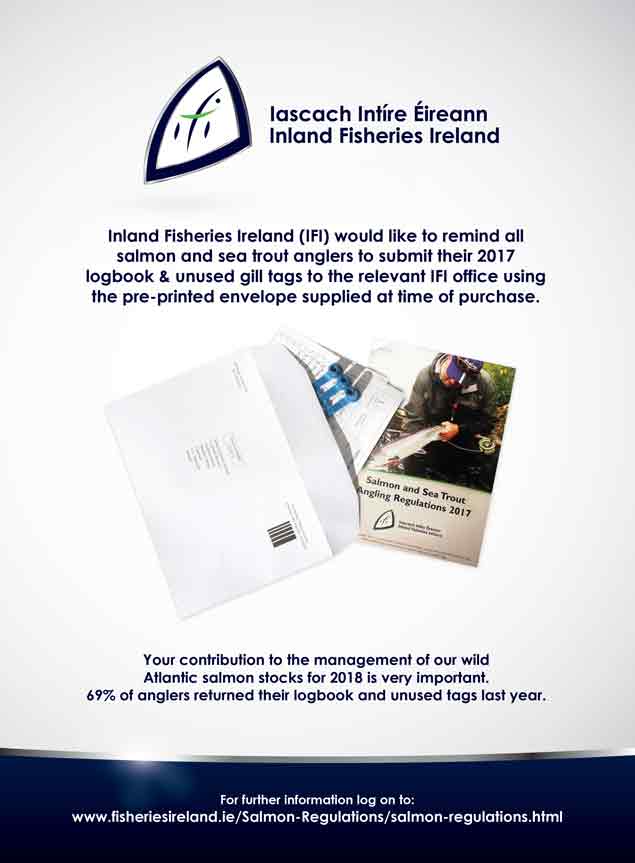
For further information click here
Wild Salmon & Sea Trout Tagging Scheme (Amendment) Regulations 2017 and Conservation Measures For 2018 Season
#Angling - Sean Kyne, Minister of State at the Department of Communications, Climate Action and Environment, gives statutory notice of his intention to make the Wild Salmon and Sea Trout Tagging Scheme (Amendment) Regulations, 2017 to provide for the management of the wild salmon and sea trout fishery by Inland Fisheries Ireland from 1 January 2018.
A copy of the draft regulations is open for public inspection at the offices of the department in Cavan and also at the offices of Inland Fisheries Ireland.
Any person may submit observations and.or objections to the draft regulations at any time during the period of 30 days concluding Thursday 14 December either by e-mail to [email protected] or to the following address:
Inland Fisheries Division
Department of Communications, Climate Action and Environment,
Elm House,
Earlsvale Road,
Cavan Town
H12 A8H7
Ireland
Tel (01) 6783071 / Lo-call 1890 449900 Ext 3071
Note that rates charged for the use of the 1890 number may vary between service providers.
All submissions received will be published on the department’s website following the conclusion of the consultation period.
#Angling - An angling bye-law focusing on salmon and sea trout has come into effect for Burrishoole, Co Mayo.
Sean Kyne, Minister of State with responsibility for Inland Fisheries, introduced the Conservation of Salmon and Sea Trout Shramore (Burrishoole)(Catch and Release) Bye Law No 951 into operation on Tuesday 13 June.
The new bye-law provides for catch and release angling for salmon and sea trout over 40cm in length in the Shramore (Burrishoole) system, and applies to Lough Furnace and the Seven Arch Bridge on the L5435 (old Newport Road).
Operative from Wednesday 14 June till Saturday 30 September, the bye-law and provides for the use of single barbless hooks while prohibiting the use of worms as bait in angling for salmon and sea trout.
‘Catch and release’ angling refers to the method of carefully handling any fish caught and immediately returning the fish alive to the water. This form of angling has a significant positive impact on the survival rate of released fish.
In addition, salmon and sea trout caught by fly fishing using single barbless hooks have a greater chance of survival than fish caught on barbed hooks. Barbless hooks do less damage, are easier to remove and reduce handling time which can be an important factor influencing survival.
Salmon and sea trout are some of Ireland’s main wild fish species attracting domestic and overseas anglers alike. Angling contributes €836 million to the Irish economy annually and supports upwards of 11,000 jobs which are often in rural communities.
Dr Ciaran Byrne, chief executive of Inland Fisheries Ireland, said: “Our salmon and sea trout stocks are extremely valuable. These new measures at Shramore, Burrishoole, will allow us to introduce a number of important methods which will help us protect these populations into the future.”
Anglers are requested to familiarise themselves the details of the new bye-law, available as a PDF to read or download HERE.


























